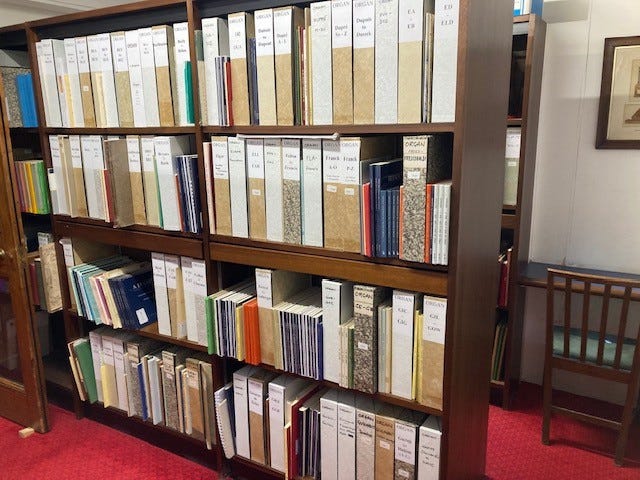I suspect that most organists seek to expand the repertoire they are playing. This could be horizontally (similar in style and difficulty) or vertically (improving technique and exploring new styles). The scale of the organ repertoire is vast. It has been diligently collated by John Henderson, the Honorary Librarian of the Royal School of Church Music in A Directory of Composers for the Organ. The first edition was published in 1996 and the third edition in 2005. The third edition covers 17,000 composers from 100 countries. Even if you assume an average of five compositions per composer that works out at approaching 100,000 compositions.
The photograph above shows one of the two stacks of organ music in the library of the Royal College of Music.
When it comes to expanding your own library there are three main considerations. What music is available that satisfies either horizontal or vertical expansion, how the level of difficulty can be assessed and how a copy of the music can be obtained. All three present difficulties!
A good place to start to identify pieces of a similar level of difficulty is to browse through the repertoire lists from examination organisations. Even if you do not have any organ ‘grades’ you can find the pieces you do have in the repertoire lists and use them as a basis for finding equally playable pieces. In the section below all the links are to PDF documents but none are large files.
The broadest range of examinations are those offered by the Associated Boards of the Royal Schools of Music, which to my surprise I recently discovered was established in 1889. The ABRSM offers the traditional graded examinations up to Grade 8 as either as practical examinations and as performance grades. The latter, as the title indicates, is on repertoire rather than on broader aspects of musicianship. The pieces listed in the two examination schemes is the same – the list on the performance grades is easier to browse through.
The Board also offers diploma level examinations which have recently been restructured into LRSM and FRSM qualifications.
Trinity College offers ATCL, LTCL and FTCL examinations, and as with the ABRSM, the Fellowship level is very demanding. The repertoire lists for all three examinations are published in a single document.
In the Royal College of Organists examinations at ARCO and FRCO the performance aspects are only one part of the examination. There are also of keyboard skills and paperwork requirements. As a result, the repertoire lists are somewhat shorter than ABRSM and Trinity College.
The London College of Music at the University of West London does not seem to publish specific repertoire lists for its examinations.
The American Guild of Organists has a similar approach to the RCO for professional certification and publishes the repertoire lists for all its examinations in a single document.
Compared to the AGO the repertoire lists for the Royal Canadian College of Organists are quite short.
All these resources provide a solution to the horizontal development of repertoire based primarily on difficulty but do not help in finding pieces that could provide technical and interpretive challenges.
A fascinating list of repertoire can be found on the web site of concert organist D’Arcy Trinkwon. He has compiled a list of the pieces he has included in his recitals between 1988 and 2021. It runs to 16 pages. Most, but certainly not all, are of significant difficulty. D’Arcy also publishes the details of his recent and forthcoming recitals and these can be a useful source of pieces by lesser-known composers. I am not aware of any other concert organist who publishes a similar list.
Another valuable resources is British Organ Music of the Twentieth Century by Peter Hardwick, published in 2003. Hardwick provides a comprehensive review of British organ music which often goes into quite helpful detail in many of the pieces. The final section of the book provides a complete list of titles from over 50 composers. I reviewed this book earlier this year.
I hope this post provides you with a starting point for repertoire development. I’ll return to this topic in a few weeks’ time.




